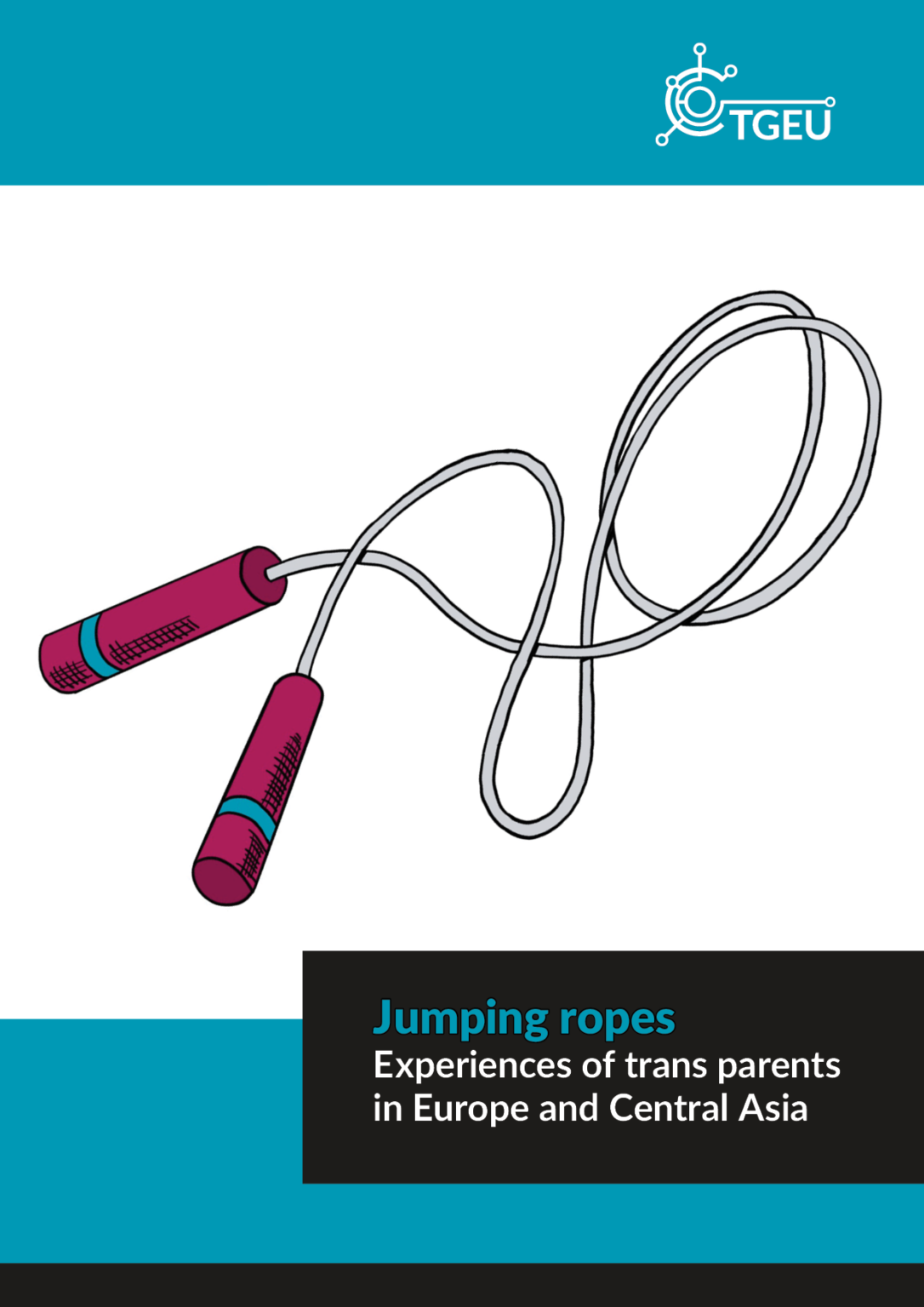TGEU Releases Its Second Report on Trans Parenthood

Following on from the 2021 report Stuck on the Swing, TGEU has launched its second report on trans parenthood, Jumping ropes: Experiences of trans parents in Europe & Central Asia. This report complements the first by discussing a variety of obstacles faced by trans parents in their daily lives that go beyond issues relating to freedom of movement.
Why this report?
This report intends to shed light on the difficult situations trans parents find themselves in, which often go unnoticed. By sharing their stories TGEU wants to enhance the voices of real trans people. Misinformation about trans people is increasingly spread and impacts vulnerable groups in particular, such as trans people caring for children.
This report is also aimed at supporting the European Commission, the Council of Europe, and governments in Europe and Central Asia in their understanding of trans parenthood and the hurdles trans parents (to be) face across the two regions. TGEU believes that the testimonies shared in this report can also contribute to the work of the Commission and EU Member States, in their efforts to implement the EU LGBTIQ Equality Strategy, including for instance in the area of legal gender recognition (LGR). They can also be helpful for other states that are in the process of LGR, reproductive rights, or family law reform.
What can I find in it?
The report is divided into two parts: the first describes testimonials from trans parents living in Europe and Central Asia on the barriers they face to accessing their rights. The second part explains how these barriers impact those same parents’ lives.
Main findings:
Trans people in Europe and Central Asia, who want to be parents or are already in a parenting role, face a wide range of barriers. For example, TGEU has found that:
- Some trans people are forced to make an impossible choice between becoming biological parents or having their gender identity legally recognised.
- Complex or non-existent legal gender recognition procedures can lead to discrimination against trans parents and their children.
- Kinship documents (birth certificates, passports, adoption papers, etc.) that are not automatically changed following a parent’s change of gender marker and/or name, can also lead to discrimination against trans parents and their children in their everyday life.
- Growing anti-trans sentiments have made life more difficult for some trans parents and their children.
- The right to private and family life of some trans parents and their children are regularly violated.
- Trans parents who are non-EU citizens may encounter additional obstacles.
The barriers may have a detrimental impact on trans parents and their families. TGEU has found that:
- The current set-up of most legal systems in the region violate the principle of the best interest of the child.
- In fear of discrimination, some trans parents hide their trans status.
- Many trans parents bear excessive emotional, social, and financial burdens as a consequence of a system that disregards them.
- Trans parents may be scared of being questioned, harassed, or even stripped of parental rights because of being trans.
Recommendations to national governments include:
- Ensure that laws and regulations in the area of family rights include and protect trans parents and their children.
- Put in place anti-discrimination legislation that extends to all areas of life and includes gender identity and expression as protected grounds.
- Abolish abusive laws and regulations that require trans people to undergo mandatory medical interventions.
- Put in place legal gender recognition legislation and procedures that are quick, easy, and accessible; and are based solely on self-determination.
- Ensure that kinship documents, such as birth certificates, adoption papers,
- IDs, passports, and other documents recognise trans parents in their correct name and legal gender.
- Ensure that kinship documents keep a person’s gender history confidential and provide parents with the option of choosing gender-neutral titles.
Recommendations to the European Commission include:
- Support Member States put in place legal gender recognition legislation and procedures that are quick, easy, and accessible; based solely on self-determination; provide gender marker options for non-binary people; and extend gender recognition to parenthood.
- Explore possible measures to support the mutual recognition of civil status documents, and therefore legal gender recognition decisions.
- Explore possible measures to support the mutual recognition of partnerships between Member States, with a view to ensuring that same-gender partners and trans partners are included.
- Propose a horizontal legislative initiative on the mutual recognition of parenthood between Member States that includes specific measures to facilitate the recognition of trans parents in their legal gender.
- Ensure that the revised EU guidelines on free movement include trans parents, their spouses, ‘durable partners’, and children in their scope.
- Foster the exchange of best practice between the Member States on ensuring the right to freedom of movement to trans parents and their children, and provide reliable and comparable data with support from the European Union Agency for Fundamental Rights (FRA).
“Just allow us to have a life. Nothing else, just let us be who we are, have kids, have a normal life.”
Yanis, Romania/UK